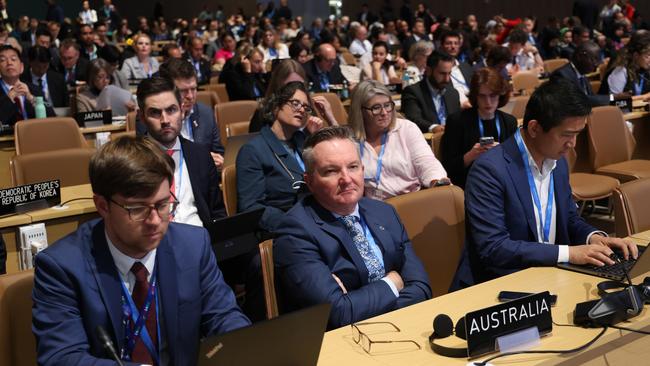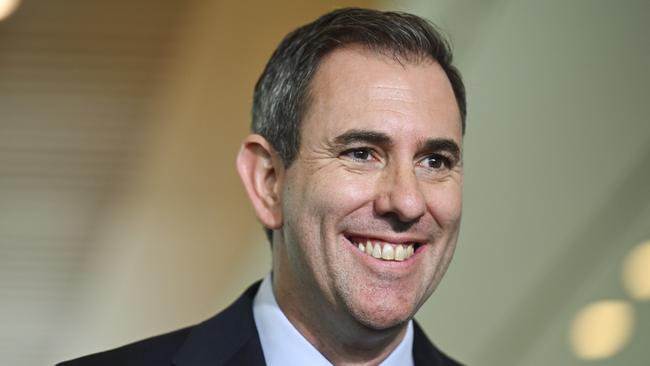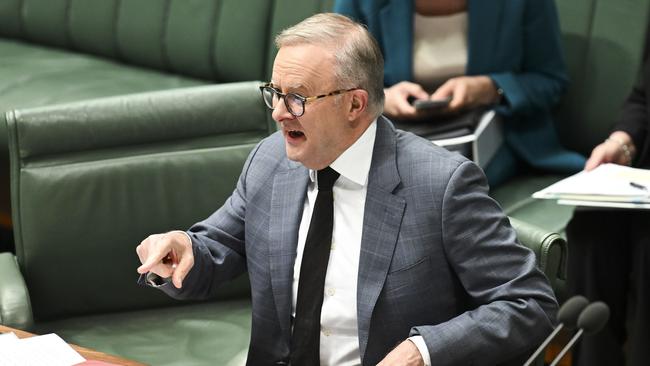First, Energy Minister Chris Bowen must think the voting members of Generation Z will not wake up that his proposed $660bn outlay over 25 years to 2050 on a renewables-gas energy scheme will send power prices skyrocketing and keep the cost of living and interest rates high.
And big slabs of that $660bn Bowen investment must be replaced after about 20 years.

If the Coalition can show Generation Z that there is a better way to slash emissions, Peter Dutton might attract the intelligent youth vote at the next election. Obviously nuclear will be in the mix, but the Coalition proposal needs to be wider.
Jim Chalmers duplicates the Bowen strategy at the other end of the age spectrum.
The Treasurer gambles that his proposed tax on unrealised capital gains in superannuation - the so-called grandma’s and farmers tax - will not enrage them, and they will not broadcast the tax loud and clear to their families.
A well financed group has been formed around the “family tax” banner and is planning to campaign on the tax to make sure the Federal Opposition Leader regains at least seven seats via family hostility. If the group can mobilise grandmas and their families, they will do much better than just seven seats.
Dutton needs to win back the 19 seats the Coalition lost in the last election, plus a couple more. His greatest assets maybe Bowen and Chalmers.
Let me explain the forces behind the community attacks on Bowen and Chalmers.
Newcastle-based Tomago Aluminium is Australia’s largest aluminium smelter and is owned by Rio Tinto, CSR and Norway’s Norsk Hydro.
The enormous power costs required to make a Bowen’s $660bn investment anywhere near economic convinced the partners the plant would have to shut in 2028.
Tomago employs more than 1000 full-time equivalent staff as well as 200 contractors. The Tomago shut down is just the start. The higher power cost consequences of the $660bn Bowen power generation and distribution plan will shut enterprises requiring high skills around the country. Dutton needs an 18 per cent swing to gain the Newcastle seat, so winning the seat is probably impossible. But the Newcastle anger with Bowen will be white-hot and will be underlined by the plan to erect one of the highest cost power projects in the world dash - wind power off the coast of Newcastle. As I have pointed out previously, the $660bn cost estimate of the Bowen plan is calculated by Frontier Economics who were hired by government bodies to cost the plan conceived by Bowen and state premiers apparently without any regard to cost.
Huge power prices and/or massive subsidies paid by taxpayers are required to make that investment economic.
I believe most young people believe their future is linked to reducing emissions. But they will also realise that their living standards will have to be dramatically reduced if that conversion to non-carbon power is badly handled. Once a well-thought-out and economic plan is prepared to reduce emissions, then those investing in the uneconomic Bowen schemes are going down a very hazardous path. The trustees of the Future Fund need to become very vocal because community money is set to be directed to badly thought out plans.
The fact that Australia is rejecting US urgings to be part of carbon reducing nuclear power research illustrates that the $660bn Bowen plan is about politics, not seeking to reducing emissions in an economical way.
Under the Bowen plan, the nation is facing massive shut-downs that can be avoided by the nation being part of the exciting alternatives that are now available. Nuclear is not the only one.
Chalmers’ grandmas and farmers tax is set to come before the Senate this week, and the rumours spreading around Canberra suggest that David Pocock will renege on previous promises and allow unrealised capital gains to be taxed.

I hope those rumours are wrong, but even if Pocock honours his undertakings, the tax will still be on the agenda if Chalmers remains to as treasurer after the next election.
Chalmers is proposing two taxes. First, a 30 per cent tax on income earned on assets above $3m held by an individual in superannuation funds. This tax has widespread support.
But Chalmers also wants to tax unrealised capital gains in superannuation funds again on people with balances above $3m. This will impact vast numbers of older people because when grandpa or grandma die and their separate superannuation balances are normally combined.
Accordingly, a great many more will be hit by the tax on unrealised capital gains than the numbers being canvassed by Chalmers. I must alert readers, I am part of the grandparent community. Chalmers has structured the unrealised capital tax so it will be paid individually by grandma or grandpa (not the fund). Tax experts say that as currently constructed, Chalmers wants to “double dip” in his “grandma” attack so. When the asset is sold the by the fund(s) it may be forced to pay tax separate from the tax already paid individually by “grandma”.
Silly situations like this can arise because this was a tax devised by Chalmers in a hurry when he discovered that his mates in the industry superannuation funds had antiquated accounting systems that couldn’t provide the data to properly calculate his first tax.
Julian Simmonds, who lost his Brisbane seat of Ryan at the last election to Greens’ Elizabeth Watson-Brown, has launched Australians for Prosperity (A4P) and will focus a major campaign on “no family savings tax”.
The initial campaign will be focus on the marginal Labor seats of Tangney, Chisholm, Higgins and Adelaide but will also extend to the Teal held seats of Wentworth, Warringah and Goldstein. Very large sums appear likely to be directed towards defending Australian middle income families from the Chalmers’ attack. The above seats may be just the start.
More Coverage







Australia has two federal ministers who maybe underestimating voter intelligence.